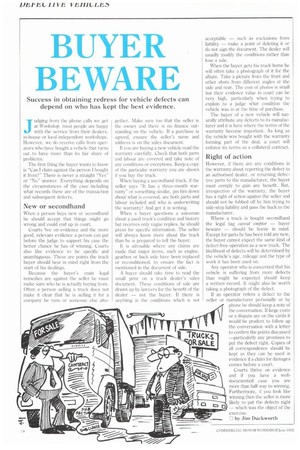BUYER BEWARE
Page 104

If you've noticed an error in this article please click here to report it so we can fix it.
Success in obtaining redress for vehicle defects can depend on who has kept the best evidence.
Judging from the phone calls we get at Workshop. most people are happy with the service from their dealers, in-house or local independent workshops. However, we do receive calls from operators who have bought a vehicle that turns out to have more than its fair share of problems.
The first thing the buyer wants to know is "Can I claim against the person I bought it from?" There is never a straight "Yes" or "No" answer. Everything depends on the circumstances of the case including what records there are of the transaction and subsequent defects.
New or secondhand
When a person buys new or secondhand he should accept that things might go wrong and could end up in court.
Courts live on evidence and the more good, relevant evidence a person can put before the judge to support his case the better chance he has of winning. Courts also like evidence to be specific and unambiguous. These are points the truck buyer should bear in mind right from the start of his dealings.
Because the buyer's main legal remedies are against the seller he must make sure who he is actually buying from. Often a person selling a truck does not make it clear that he is selling it for a company he runs or someone else alto gether. Make sure too that the seller is the owner and there is no finance outstanding on the vehicle. If a purchase is agreed, ensure the seller's name and address is on the sales document.
If you are buying a new vehicle read the warranty carefully. Check that both parts and labour are covered and take note of any conditions or exceptions. Keep a copy of the particular warranty you are shown if you buy the truck.
When buying a secondhand truck, if the seller says "It has a three-month warranty" or something similar, pin him down about what is covered, are both parts and labour included and who is underwriting the warranty? And get it in writing.
When a buyer questions a salesman about a used truck's condition and history but receives only vague replies, he should press for specific information. The seller will always know more about the truck than he is prepared to tell the buyer.
It is advisable where any claims are made that major items, such as engine. gearbox or back axle have been replaced or reconditioned, to ensure the fact is mentioned in the document of sale.
A buyer should take time to read the small print on a truck dealer's sales document. These conditions of sale are drawn up by lawyers for the benefit of the dealer — not the buyer. If there is anything in the conditions which is not acceptable — such as exclusions from liability — make a point of deleting it or do not sign the document. The dealer will usually modify the conditions rather than lose a sale.
When the buyer gets his truck home he will often take a photograph of it for the album. Take a picture from the front and other shots from different angles at the side and rear. The cost of photos is small but their evidence value in court can be very high, particularly when trying to explain to a judge what condition the vehicle was in at the time of purchase.
The buyer of a new vehicle will naturally attribute any defects to its manufacturer and it is here where the terms of the warranty become important. As long as the vehicle was bought with the warranty forming part of the deal, a court will enforce its terms as a collateral contract.
Right of action
However, if there are any conditions in the warranty about reporting the defect to an authorised dealer, or returning defective parts to the manufacturer, the buyer must comply to gain any benefit. But. irrespective of the warranty. the buyer has a right of action against the seller and should not be fobbed off by him trying to side-step liability and pass the buck to the manufacturer.
Where a truck is bought secondhand the legal tag caveat emptor — buyer beware — should be borne in mind. Except for parts he has been told are new, the buyer cannot expect the same kind of defect-free operation as a new truck. The likelihood of defects will be determined by the vehicle's age, mileage and the type of work it has been used on.
Any operator who is concerned that his vehicle is suffering from more defects than might be expected should keep a written record. It might also be worth taking a photograph of the defect.
If an operator refers a defect to the seller or manufacturer personally or by phone he should keep a note of the conversation. If large costs or a dispute are on the cards it would be prudent to follow up the conversation with a letter to confirm the points discussed —particularly any promises to put the defect right. Copies of all correspondence should be kept as they can be used in evidence if a claim for damages comes before a court.
Courts thrive on evidence and if you have a welldocumented case you are more than half way to winning. Furthermore, if you look like winning then the seller is more likely to put the defects right — which was the object of the exercise.
[1 by Jim Duckworth














































































































